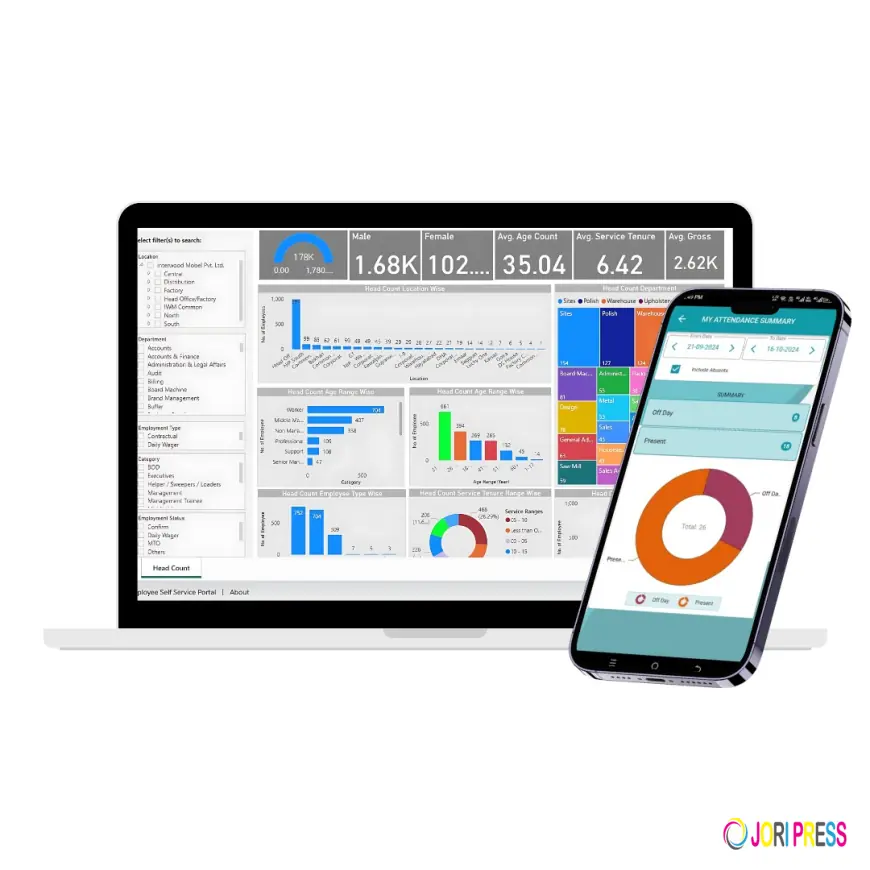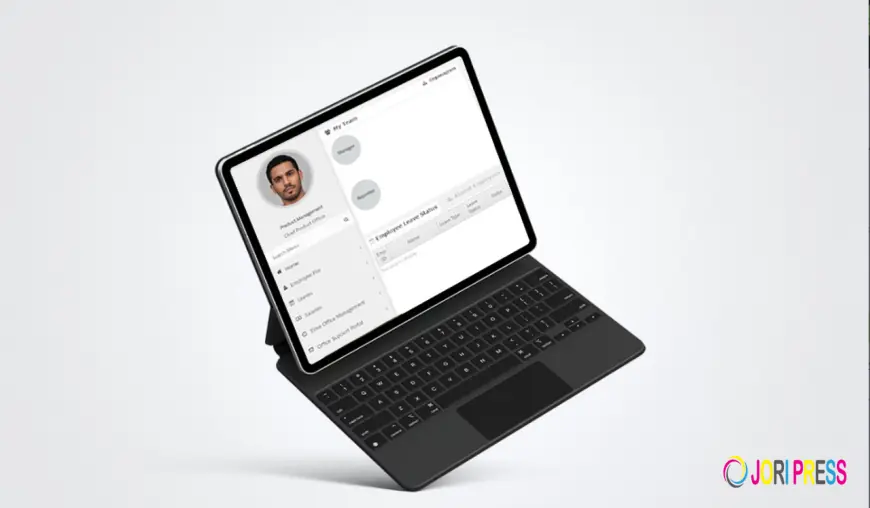What should I look for when choosing HR software?
Choose the right HR software in Pakistan and see how SmartHCM automates HR tasks, improves efficiency, and enhances employee experience.
Introduction: Why Choosing the Right HR Software Matters
Selecting the right HR software is a critical decision that directly impacts your company’s efficiency, employee satisfaction, and overall performance. The right solution simplifies HR tasks such as payroll management, attendance tracking, and employee engagement while saving time and reducing errors. With many options available in the market, understanding what features to prioritize ensures your investment supports long-term growth and improves workplace productivity. A well-chosen HR software acts as a central hub that connects departments, automates repetitive tasks, and keeps employee data organized in one secure place.
Understand Your Company’s HR Needs
Before choosing any HR software, it’s essential to identify your organization’s specific needs and pain points. Small businesses may require basic tools for payroll and leave management, while larger enterprises might need advanced analytics, recruitment, and performance monitoring modules. Understanding your company’s size, workforce type, and operational goals helps narrow down the right software that aligns with your business objectives. When you know what you need, you can choose HR software that truly supports your human resource strategy instead of adding unnecessary complexity.
Identify the Core Features You Need
Not all HR software offers the same features, so focusing on essential tools ensures you make the best choice for your business. Look for functionalities like payroll automation, employee database management, attendance tracking, and performance evaluation. Some advanced HR systems also provide recruitment tracking and onboarding tools, making it easier to manage the entire employee lifecycle. Prioritizing core features helps you avoid paying for modules you won’t use while ensuring your HR team has all the necessary tools to operate efficiently.
User-Friendly Interface and Easy Navigation
A user-friendly interface is one of the most vital aspects of effective HR software. Employees and HR professionals should be able to navigate through the system easily without constant training or support. A clean dashboard, intuitive design, and simple layout improve user adoption and reduce the time spent learning new tools. When employees find the system easy to use, they are more likely to update their information, apply for leave, and engage with the software regularly—enhancing overall efficiency across your organization.
Automation Capabilities
The best HR software includes automation features that minimize manual effort and streamline daily operations. Automating tasks such as salary processing, leave approvals, and timesheet management can save hours of administrative work every week. Automation also reduces human error, improves compliance, and allows HR teams to focus on strategic initiatives like talent development and employee engagement. With automation at the core, your HR department becomes more efficient and responsive to both management and staff needs.
Integration with Existing Systems
Integration is a crucial factor to consider when selecting HR software, as it should work seamlessly with your current tools and databases. Your HR solution should easily connect with payroll, accounting, ERP, and attendance systems to ensure smooth data flow across departments. Integrated systems eliminate data duplication, reduce manual entry, and create a unified ecosystem for employee management. The better your HR software integrates, the more efficient your overall business operations will become.
Cloud-Based vs. On-Premise Solution
When choosing HR Software, businesses often face the decision between cloud-based and on-premise systems. Cloud-based HR solutions offer flexibility, remote access, and automatic updates without heavy IT maintenance. On-premise software, on the other hand, gives you more control over data storage and customization but requires in-house server management. The right choice depends on your company’s security policies, budget, and technical capabilities. However, for most modern businesses, cloud-based HR Software provides better scalability and convenience.
Data Security and Privacy
Protecting sensitive employee data is one of the top priorities when implementing HR software. The software must include advanced encryption, secure login credentials, and compliance with data protection regulations. HR data such as salary details, personal information, and performance reports must be safeguarded against unauthorized access. Choosing a vendor with a strong reputation for security helps ensure your organization’s data remains private and protected at all times, building trust among employees and management.
Scalability for Future Growth
The right HR software should grow with your business and adapt to future changes. As your workforce expands or new HR functions are added, your software must be able to handle more users, data, and integrations without slowing down. Scalable systems allow businesses to add modules or features as needed, making them a long-term investment rather than a short-term solution. By selecting scalable HR software, companies avoid the need for frequent replacements or costly upgrades later.
Mobile Accessibility
In today’s mobile-driven world, HR Software that offers mobile accessibility is essential for remote and hybrid teams. Employees should be able to check their attendance, apply for leave, or view pay slips directly from their smartphones. Mobile access enhances flexibility and ensures HR processes continue smoothly, even when employees are on the go. A mobile-friendly HR system improves convenience, boosts employee engagement, and keeps your workforce connected anytime, anywhere.
Customization Options
Every organization has unique HR workflows, so it’s important to choose HR Software that offers customization options. From adjusting dashboards and reports to configuring approval workflows, customization ensures the system aligns with your specific needs. Tailored software enhances productivity by fitting seamlessly into existing business operations rather than forcing your team to adapt to rigid templates. The more flexible your HR software is, the better it can support your company’s evolving HR strategies.
Employee Self-Service Portal
Modern HR software should empower employees through a self-service portal where they can update personal details, check attendance, view pay slips, and submit leave requests without HR intervention. This not only saves time for HR departments but also gives employees greater control and transparency over their own information. Self-service features improve satisfaction, reduce administrative burden, and create a more empowered workforce that values digital efficiency.
Reporting and Analytics Tools
Strong reporting and analytics capabilities are essential features of quality HR software. These tools provide actionable insights into employee performance, attendance patterns, turnover rates, and payroll expenses. With customizable reports and dashboards, HR managers can make data-driven decisions that improve workforce planning and operational efficiency. Analytics also help identify trends, forecast future needs, and evaluate HR policies’ effectiveness—all from one powerful platform.
AI and Voice-Enabled Assistance
The latest generation of HR software integrates AI and voice-enabled features that enhance usability and efficiency. With AI assistants, HR professionals can automate routine inquiries, streamline approvals, and gain instant insights into workforce data through voice commands. These intelligent tools reduce administrative workload, speed up communication, and improve decision-making accuracy. Voice-enabled HR software represents the future of HR management, combining convenience with innovation.
Vendor Reputation and Support Services
When selecting HR software, always consider the reputation and customer support provided by the vendor. Research customer reviews, case studies, and testimonials to understand the software’s performance and reliability. Good vendors offer continuous updates, training resources, and responsive support channels to resolve technical issues quickly. Reliable post-sales service ensures smooth implementation and long-term satisfaction with your HR system.
Cost and Licensing Model
Pricing is a major factor in choosing HR software, and businesses should evaluate different licensing models before purchasing. Some software options charge a one-time fee, while others use monthly or annual subscriptions based on user count. Understanding your budget, usage level, and required features will help you select the most cost-effective plan. Remember, the cheapest option is not always the best—choose software that delivers value, scalability, and reliable support.
Free Trials and Demos
Most reputable HR software providers offer free trials or live demos, allowing you to explore the system before making a final decision. Testing the software helps you understand its interface, features, and compatibility with your current setup. This hands-on experience ensures that you choose a platform that truly meets your operational needs and user expectations. Always take advantage of trial periods to make an informed, confident decision.
Boost HR Efficiency in HR Resources
Many organizations are choosing SmartHCM as their go-to because it simplifies HR operations through automation, AI assistance, and mobile accessibility. From payroll management and attendance tracking to leave approvals and employee self-service, SmartHCM reduces repetitive tasks and minimizes errors, allowing HR teams to focus on strategic initiatives. Its intuitive design ensures employees can easily access their information, submit requests, and stay engaged, while managers gain real-time insights to make data-driven decisions. By integrating SmartHCM, businesses can improve productivity, streamline workflows, and create a more efficient, employee-friendly workplace.
Final Decision: Balancing Features, Cost, and Usability
Ultimately, choosing the right HR software requires a balanced approach that considers functionality, user experience, security, and budget. The best solution is one that simplifies complex HR tasks, integrates with your existing systems, and adapts to your company’s future growth. By carefully evaluating your needs and comparing options, you can invest in HR Software that strengthens your HR operations, enhances productivity, and supports long-term organizational success.
What's Your Reaction?
 Like
0
Like
0
 Dislike
0
Dislike
0
 Love
0
Love
0
 Funny
0
Funny
0
 Angry
0
Angry
0
 Sad
0
Sad
0
 Wow
0
Wow
0



















































